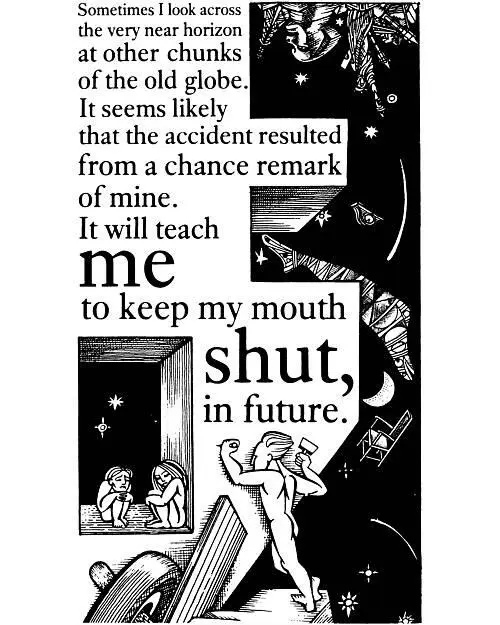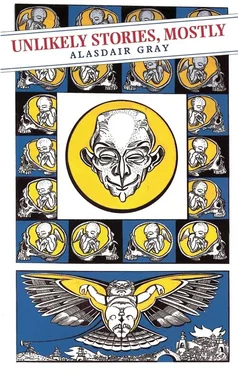I said, “Dig a tunnel.”
“What do you mean?”
“Instead of drinking coffee when you feel bored, go down to the basement and dig an escape tunnel.”
“But if I wanted to escape I could walk through the front door and not come back.”
“You can’t escape that way. The education department would stop your bursary and you would have to work for a living.”
“But where would I be escaping to?”
“That isn’t important. To travel hopefully is better than to arrive.”
My suggestion was not meant seriously but it gained much support in the painting department. In the seldom-visited sub-basement a flagstone was replaced by a disguised trap-door. Under this a room was dug into the school’s foundation. The tunnel began here, and here the various shifts operated the winch which pulled up boxes of waste stuff, and put the waste into small sacks easily smuggled out under the clothing. The school was built on a bank of igneous quartz so there was no danger of the walls caving in and no need of pitprops. Digging was simplified by the use of a chemical solvent which, applied to the rock surface with a handspray, rendered it gravelly and workable. The credit for this invention belonged to the industrial design department. The students of this department despised the painters digging the tunnel but it interested them as a technical challenge. Without their help it could not have reached the depths it did.
In spite of the project’s successful beginning I expected it to fail through lack of support as the magazine, the debating society and the outing to Linlithgow had failed, so I was surprised to find after three months that enthusiasm was increasing. The Students’ Representative Council was packed with members of the tunnel committee and continually organized dances to pay for the installation of more powerful machinery. A sort of tension became obvious throughout the building. People jumped at small sounds, laughed loudly at feeble jokes and quarrelled without provocation. Perhaps they unconsciously feared the tunnel would open a volcanic vent, though things like increase of temperature, water seepage and the presence of gas had been so far absent. Sometimes I wondered how the project remained free from interference. An engineering venture supported by several hundred people can hardly be called a secret. It was natural for those outside the school to regard rumours as fantastic inventions, but why did none of the teachers interfere? Only a minority were active supporters of the project; two were being bribed to remain silent. I am sure the director and deputy director did not know, but what about the rest who knew and said nothing? Perhaps they also regarded the tunnel as a possible means of escape. One day work on the tunnel stopped. The first shift going to work in the morning coffee-break discovered that the basement entrance was locked. There were several tunnel entrances now but all were found to be locked, and since the tunnel committee had vanished it was assumed they were inside. This caused a deal of speculation.
I have always kept clear of mass movements, so on meeting the president of the committee in a lonely upper corridor one evening, I said, “Hullo, Mildred,” and would have passed on, but she gripped my arm and said, “Come with me.”
She led me a few yards to the open door of what I had thought was a disused service lift. She said, “You’d better sit on the floor,” and closed the gates behind us and pulled a lever. The lift fell like a stone with a noise so high-pitched that it was sometimes inaudible. After fifteen minutes it decelerated in violent jerks, then stopped. Mildred opened the gates and we stepped out.
In spite of myself I was impressed by what I saw. We stood in a corridor with an arched ceiling, asphalt floor and walls of white tile. It swept left and right in a curve that prevented seeing more than a mile in each direction. “Very good,” I said, “very good indeed. How did you manage it? The fluorescent lighting alone must have cost a fortune.”
Mildred said gloomily, “We didn’t make this place. We only reached it.”
At that moment an elderly man passed us on a bicycle. He wore a peaked cap, an armband with some kind of badge on it and was otherwise naked, for the air was warm. As he passed he raised a hand in a friendly gesture. I said, “Who was that?”
“Some kind of official. There aren’t many of them on this level.”
“How many levels are there?”
“Three. This one has dormitories and canteens for the staff, and underneath are the offices of the administration, and under that is the engine.”
“What engine?”
“The one that drives us round the sun.”
“But gravity drives the world round the sun.”
“Has anyone ever told you what gravity is and how it operates?”
I realized nobody ever had. Mildred said, “Gravity is nothing but a word top-level scientists use to hide their ignorance.”
I asked her how the engine was powered. She said, “Steam.”
“Not nuclear fission?”
“No, the industrial design boys are quite certain it’s a steam engine of the most primitive sort imaginable. They’re down there measuring and sketching with the rest of the committee. We’ll show you a picture in a day or two.”
“Does nobody ask what right you have to go poking about inside this thing?”
“No. It’s like all big organizations. The staff are so numerous that you can go where you like if you look confident enough.”
I had to meet a friend in half an hour so we got into the lift and started back up. I said, “Well, Mildred, it’s interesting of course, but I don’t know why you brought me to see it.”
She said, “I’m worried. The others keep laughing at the machinery and discussing how to alter it. They think they can improve the climate by taking us nearer the sun. I’m afraid we’re doing wrong.”
“Of course you’re doing wrong! You’re supposed to be studying art, not planetary motion. I would never have suggested the project if I’d thought you would take it to this length.”
She let me out on the ground floor saying, “We can’t turn back now.”
I suppose she redescended for I never saw her again.
That night I was wakened by an explosion and my bed falling heavily to the ceiling. The sun, which had just set, came up again. The city was inundated by sea. We survivors crouched a long time among ruins threatened by earthquakes, avalanches and whirlwinds. All clocks were working at different speeds and the sun, after reaching the height of noon, stayed there. At length the elements calmed and we examined the new situation. It is clear that the planet has broken into several bits. Our bit is not revolving. To enjoy starlight and darkness, to get a good night’s sleep, we have to walk to the other side of our new world, a journey of several miles, with an equally long journey back when we want daylight.
It will be hard to remake life on the old basis.

THE COMEDY OF THE WHITE DOG
On a sunny afternoon two men went by car into the suburbs to the house of a girl called Nan. Neither was much older than twenty years. One of them, Kenneth, was self-confident and well dressed and his friends thought him very witty. He owned and drove the car. The other, Gordon, was more quiet. His clothes were as good as Kenneth’s but he inhabited them less easily. He had never been to this girl’s house before and felt nervous. An expensive bunch of flowers lay on his lap.
Kenneth stopped the car before a broad-fronted bungalow with a badly kept lawn. The two men had walked halfway up the path to the door when Kenneth stopped and pointed to a dog which lay basking in the grass. It was a small white sturdy dog with a blunt pinkish muzzle and a stumpy tail. It lay with legs stuck out at right angles to its body, its eyes were shut tight and mouth open in a grin through which the tongue lolled. Kenneth and Gordon laughed and Gordon said, “What’s so funny about him?”
Читать дальше













